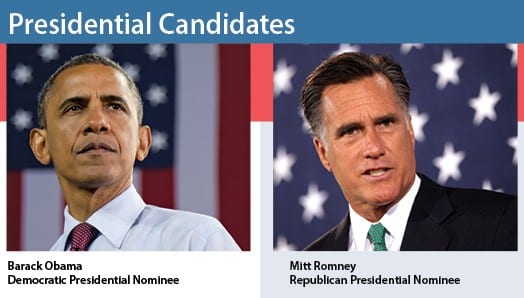Will the Economy Affect the 2012 Presidential Election?
“It’s the economy, stupid,” was the mantra of Bill Clinton’s successful 1992 presidential campaign. At a time when the country was recovering from two-and-a-half quarters of recession and with unemployment reaching almost eight percent as late as June, conventional wisdom, as well the pervading belief in Clinton’s War Room, maintained that people would vote their pocketbooks.
And that meant that a second George H.W. Bush term would fall victim to the nation’s economic woes.
Of course, even looking back it’s hard to truly quantify the benchmarks that went into Clinton’s victory. Was it the economy, stupid? Clinton’s “I feel your pain” charisma? Ross Perot’s spoiler run (Clinton received only 43 percent of the popular vote)? Or a combination of the three that ultimately handed the White House to the challenger from Hope?
Sociologists and historians tell us that the direction of the economy in an election year influences voters more heavily than any other issue – including wars and social concerns – and that poor economic performance tends to hurt the incumbent party’s presidential candidate. Certainly in 1992, the state of the economy was a factor. But how significant a factor it was can be disputed endlessly.
Does Political Past Predict the Future?
Today America is arguably more unequal economically than at any time since the 1920s:
- 1 in 6 of us is considered poor, sending more and more people to things like payday lending businesses just to pay the bills
- Our unemployment rate stubbornly staying above 8 percent
- Millions of homes are in default
- And the economy had a meager 1.5 percent growth rate in the second quarter of 2012.
So it behooves one to surmise just how much the country’s economic condition will influence the 2012 presidential election. If past is a prologue, then President Obama’s chances for re-election are questionable.
Can crunching the numbers presage an outcome? Maybe. But exactly which economic indicators should be included in the proposition? The Federal Reserve lists more than 55,000 separate economic measurements in its database, and undoubtedly they are all experienced by the American public in different ways – the hedge fund investor and the unemployed factory worker don’t live by the same math.
What 538 Blog Says
So it may be instructive to put the question to today’s most fashionable political prognosticator, Nate Silver, a statistician and forecaster whose popular FiveThirtyEight blog for The New York Times is de riguer reading by both pundits and poll watchers. Silver created an easier-to-wade-through collection of data that looks at the performance of the economy over roughly the past half-year. His seven categories include nonfarm payrolls; personal income; industrial production; inflation; forecasted gross domestic product (GDP); the stock market; and personal consumption expenditures.
Silver notes some bright spots. The rate of industrial activity is strong, inflation is low, and the stock market has rebounded. Conversely, growth in income has been poor, consumption is sluggish, and GDP forecasts are anemic.
But after weighting and sifting through his seven chosen components with a mathematical perspicacity that Einstein would have marveled at, Silver reduced the mountain of statistics to an index that reads 2.5 percent. That is narrowly above the 2.0 percent point where, according to his own methodology, an incumbent president becomes the underdog. So essentially, Silver accepts the premise that it is the economy, stupid, and he gives a slight edge to Obama over Republican challenger Mitt Romney.
Romney, Obama Keep Spinning
Both the Romney and Obama campaign teams are trying to frame economic issues in ways that will attract the approximately 10 percent of the electorate still considered undecided. This is the 10 percent expected to sway the election to one side or the other.
Romney’s goal is to convince everyone how ill the consumer debt winds – among other economic issues – are blowing while laying the blame at the current skipper’s prow. Obama needs to remind people that he inherited the debt storm in which people are now treading water.
Of course, in the daily spin cycle of the 24/7 news/entertainment universe, the nation’s economic debate, like a wet sock, often gets left in a corner of the bin. On Monday, Romney’s tax returns lead the echo chamber. On Tuesday, it’s assorted Medicare scares and Welfare obfuscations. Wednesday brings talk of abortion and “legitimate rape.” On Thursday, the cameras capture the latest on Republican vice-presidential nominee Paul Ryan. And on Friday we’re back to Romney’s tax returns.
Undoubtedly the economists will continue to contend that each voter will look into his or her wallet moments before entering the booth and use the contents therein as the main yardstick for picking a winner. Demographers will insist that it’s all about race, gender, and class. Activists of all stripes will widen the strike zone to include their own social issues as the ones that will propel both adherents and adversaries to the polls.
So how will the economy affect the 2012 presidential election? The answer: We really don’t know.








